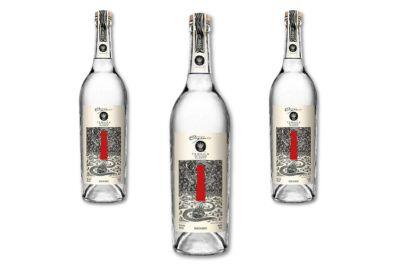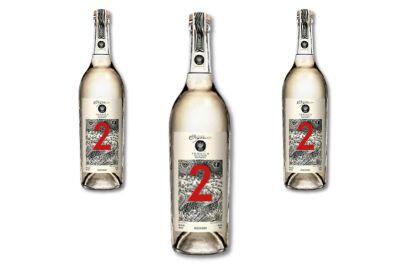TheRoundup is reader supported. We may earn a small commission when you make a purchase via links on this site, at no cost to you.
All products are personally reviewed and tested in accordance with our Review Methodology.

My old friend tequila...the magical elixir that made me uninhibited, conversational, energized, and reflective during my college years. Or at least that's how I felt! ????
Quality tequila is not about slamming shots or dealing with a nasty hangover. This oh-so-versatile spirit can range from super smooth to full of agave flavor intensity, making it an ideal choice for sipping neat and adding depth to cocktails.
But what if you want to add a splash of social and environmental responsibility to your drink?
Well, you're in the right place. Here's my list of the best organic tequila brands available in the US in 2023.


This is my dad's all-time favorite tequila, and it's quickly becoming my 'go-to' sip for special occasions.
It's meticulously handcrafted, undergoing an intricate aging process in newly charred French oak barrels to create a uniquely delicate and subtly sweet essence.
I find Joel Richards slightly hotter on the mouth than most other extra añejoe tequilas (which I like!).


I love to drink Solento Organic Anejo Tequila as I would a quality single malt scotch (in a thick, wide glass with one large ice cube).
This tequila undergoes an 18-month aging process in American oak barrels, resulting in a delightful blend of smooth and buttery maple notes with a satisfying tannic kick at the end.
Crafted in small batches from a single estate with 100% organic blue agave, Solento Organic Anejo is a USDA-certified organic sipping tequila. It exemplifies the art of tequila-making with its comprehensive attention to sustainable and organic practices.
Awarded the silver medal at the renowned San Francisco Spirits Competition, this organic tequila is known for its incredibly smooth and clean flavors.


This smooth blanco is always in the Miller kitchen and the leading player in our weekend Mexican Mules (my favorite) and Tequila Sours (Mrs. M's favorite).
The organic agave plants used to make this tequila are nurtured for up to a decade before being carefully, ethically, and responsibly harvested to create this highly sought-after spirit.
The agaves are meticulously handpicked and slowly cooked in stone ovens for nearly 48 hours. It is during this process that their precious nectar-like juice is extracted.
Following a natural fermentation and small-batch distillation, the vibrant character of this tequila emerges.
The nose stands out the most to me among the various appealing aspects of this tequila. I love the earthy citrus smell that fills your head as you take your first sip.


123 master distiller David Ravandi created this tequila by taking the Uno Tequila mentioned above and aging it in white oak barrels for six months.
This half-year of resting in oak gives this tequila a delicate color and a subdue essence of agave on the nose. The smell swiftly gives way to a medley of flavors reminiscent of salted caramel, luscious crème brûlée, and sweet toffee.
My favorite element of this tequila is the finish. The flavors grow and deepen, leaving a refreshing minty and anise aftertaste.
You should try this one if you're seeking a lightly aged tequila that prioritizes the essence of cooked agave, accompanied by a strong finish.

✔ Single-Barrel Tequila
✔ Certified-Organic Agaves
✔ Triple-Distilled

This one-of-a-kind spirit is aged six months in French oak casks, then delicately bottled at a robust 102 proof.
The higher proof delivers a powerful kick while showcasing the exquisite agave flavors, beautifully balanced with hints of citrus, sweet honey, and fiery chili pepper.
Crafted on the Casa Noble estate in the Jalisco region of Mexico, each bottle of Casa Noble tequila is created using organic blue Weber agave plants, exclusively grown on the sprawling 3000-acre estate. Nestled amidst rolling hills and picturesque valleys, the agave fields benefit from a unique microclimate that imparts character, spice, and herbal notes to our tequila.
The high altitude and naturally fibrous agaves create a distinctive taste profile, setting Casa Noble apart from most tequila brands.
Now, let's hop in our time machine and rewind to the pre-Hispanic era, where the story of tequila began.
About 2,000 years ago, ancient Aztecs discovered the magical nectar of the agave plant. They fermented it into a milky, slightly foamy beverage known as pulque, an elixir so revered it was reserved for sacred rituals and noble feasts.
Fast forward a couple of centuries to the arrival of the Spanish conquistadors in the 16th century. They brought with them the alchemical knowledge of distillation. When they ran out of their own brandy, they turned to the local agave drink. By distilling it, they created a more robust, fiery spirit (the forefather of modern-day tequila). They called it 'mezcal wine,' and the coastal regions of Nueva Galicia were the epicenter of its production.
The tequila journey took a significant turn in 1758 when the first official permit to cultivate agave was granted to José Antonio de Cuervo (yes, that Cuervo). This marked the beginning of commercial tequila production.
Then, in 1873, tequila decided to pack its bags and head north. The Sauza family, another big name in the tequila world, exported three barrels to El Paso del Norte, marking the first tequila export to the US. It was only uphill from there, with tequila becoming a beloved spirit across borders.
In the 20th century, tequila production ramped up significantly, but not always with the best practices. Industrialization led to over-farming, the use of pesticides, and the loss of biodiversity.
But as we stepped into the 21st century, a new wave of consciousness swept over the industry. Producers began to embrace organic farming practices, returning to the traditional ways of nurturing agave without harmful chemicals.
Today, organic tequila is more than just a trend. It's a movement back to roots, a celebration of tradition, and a commitment to the planet.
It starts with agave plants grown using organic farming techniques (without synthetic pesticides or fertilizers).
These plants are nurtured for seven to ten years before their sugary hearts (piñas) are harvested by skilled jimadores.
The piñas are then baked, crushed, and fermented.
Unlike conventional tequila, organic variants ensure that fermentation happens naturally, without artificial yeasts or additives.
Post-fermentation, the liquid is distilled (sometimes after a period of aging), and voila, you've got organic tequila.
There are various types of tequila available, each with its own characteristics and flavor profile:
Organic tequila is like that friend who always recycles, drives a hybrid, and brings their own grocery bags. It's seriously committed to treating our planet with respect.
In organic farms, the blue agave plant used to make tequila is grown without synthetic pesticides or fertilizers, which means no harmful chemicals are leaching into our soils and waterways. Instead, natural pest control methods and composting techniques are used, turning the agave fields into a hub of biodiversity.
Also, many organic distilleries are adopting sustainable practices in production, such as energy-efficient distillation processes and water conservation measures.
Organic tequila practices don't just help the environment; they also benefit the farmers and their communities.
Organic farming tends to be more labor-intensive than conventional farming, creating more jobs in rural areas. This means that profits go back into local economies, providing sustainable livelihoods for farm workers.
Organic agriculture also emphasizes traditional farming practices so farmers can pass their cultural knowledge to the next generation.
By supporting organic tequila producers, you're ensuring better working conditions for people in rural areas.
Now, I'm not saying tequila is the new kale smoothie, but organic tequila has health benefits. It's free from harmful chemicals and genetically modified organisms (GMOs). That means every sip you take is as pure as a mountain spring.
While tequila won't replace your daily multivitamin, agave does have some interesting health properties. It's rich in inulin, a type of fiber that can help your gut bacteria thrive. Plus, sticking to pure, high-quality tequila can help you avoid those nasty hangovers...a win-win if you ask me!
According to The Independent in the UK, the five top tequila health benefits are:
Also, some reports suggest pesticide use can lead to cancer and other health issues. By choosing organic tequila (made with zero pesticide use), you have one less thing to worry about.
Organic tequila offers an unadulterated agave experience without artificial additives or flavorings. It's like biting into a fresh piece of fruit instead of sipping on canned juice.
Connoisseurs often note that organic tequilas have a cleaner, richer flavor profile. You can truly taste the terroir (the unique soil characteristics and climate where the agave was grown).
Some of the best organic certifications to look out for when buying tequila include:
Respected third-party certifications give you assurances that your tequila is genuinely organic and that no funny business or greenwashing is taking place.
Like organic wine, a good quality organic tequila can pair well with food. Here are some of my favorite combinations.
If you think organic tequila and spicy food sounds like a fiery romance novel waiting to happen, you're right on the money!
The robust, earthy tequila notes echo the bold flavors in spicy dishes, creating a harmonious dance of heat and sweet.
Give this a try: A plate of spicy tacos followed by a smooth sip of reposado. The tequila cools the spice while enhancing the flavors, making each bite and sip an exciting tango. It's like a salsa class for your mouth...caliente!
Now, let's transport your taste buds to a sun-soaked beach with seafood's fresh, vibrant flavors.
Give this a try: A chilled shot of blanco alongside a fresh, citrusy ceviche. The clean, crisp tequila cuts through the acidity, letting the fresh flavors of the seafood shine.
Who says tequila can't have a sweet tooth?
When paired with desserts (especially chocolate), tequila shows off its versatile charm.
Give this a try: Biting into a velvety dark chocolate, followed by a sip of añejo. The chocolate's bitterness highlights the tequila's sweet notes, creating a luxurious melt-in-your-mouth experience.
Last but not least, let's venture into the rustic, comforting world of cheese and cured meats.
Give this a try: A slice of gouda cheese or a piece of prosciutto paired with a pour of reposado. The creamy, salty flavors of the food bring out the warm, woody notes in the tequila, making each bite and sip a cozy hug.
Organic tequila is widely regarded as the healthiest choice, as organic agave is not exposed to synthetic chemicals.
No, not all tequila is organic. Many producers use synthetic chemicals to grow the agave used in their tequilas.
When buying tequila, seek out those with an organic certification. Certified tequilas undergo a stringent certification process to guarantee their organic status. It's worth noting that there are outstanding tequilas that aren't officially certified as organic.
If there's any uncertainty, refer to the manufacturer's website for details about their organic credentials and business ethics.
Generally speaking, yes. Organic tequilas are more expensive than non-organic tequilas because of the extra time and resources needed. The increased price is often due to the higher production costs associated with organic farming practices.
Each bottle of Mexican tequila must include a seal from the Tequila Regulatory Council (CRT) on its label to verify it as an authentic Mexican product.
Puro Verde is a premium tequila brand with lots of decent reviews. I'll add it to the list to be tested when I update this article. Get your details on the mailing list to be notified when this article is updated.
My favorite places to buy tequila are:
As you raise your next glass, fully immerse yourself in the sensory experience. Allow the rich flavors of tequila to dance on your taste buds, intertwining with nuanced undertones and hints of tradition.
Pause and reflect on the centuries of craftsmanship and the meticulous artistry that goes into creating this cherished spirit. From the organic fields, where the agave plants are patiently nurtured, to the distilleries, where time-honored techniques are employed, every step in the tequila-making process contributes to its unique character.
But tequila is not just a symbol of the past but also a bridge to a greener future. Embrace the environmentally friendly practices employed by forward-thinking producers who prioritize the preservation of agave fields and the surrounding ecosystems.
With every sip, you become a part of this transformative journey towards a more environmentally conscious world.
Maybe Mrs. M is right after all. Maybe I am a little bit obsessed with the stuff! ????
Are you a tequila connoisseur looking for the best tequila made using 100 percent traditional methods and organically grown agave plants?
Do you insist on only the best certified organic tequila? Or are you happy to drink spirit from organic tequila production (made from 100 percent organic agave) that's not officially certified as organic? Drop me a line and let me know.

Our core values mean we always prioritize sustainability over profit. We carefully evaluate and personally test every product to ensure they meet our high standards. All products recommended in this article were tested in accordance with our Review Methodology.
TheRoundup.org - As Seen On
